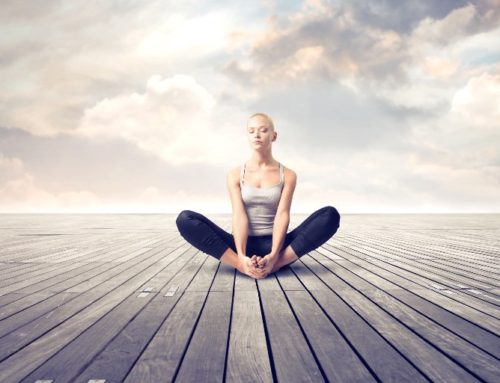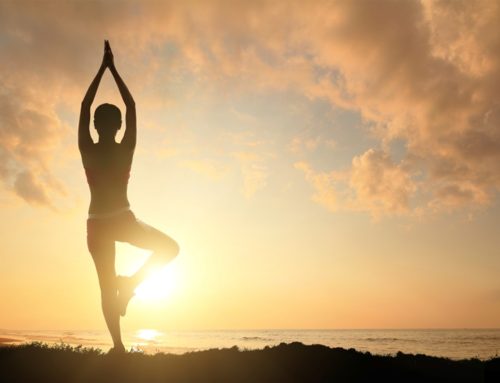 So in my last blog post I talked about The Top 4 Most Common Excuses to Avoid Meditating. Now I’d like to share what really motivates me to meditate, when it seems like there are so many other important things I have to do instead.
So in my last blog post I talked about The Top 4 Most Common Excuses to Avoid Meditating. Now I’d like to share what really motivates me to meditate, when it seems like there are so many other important things I have to do instead.
There are many benefits to meditating, but I want to share with you my personal favorites:
#1) Reduce Fear and Anxiety
If you tend to get anxious easily (like me), as soon as you sit down and start meditating, you’ll feel all your anxiety come up. You may not initially have that nice, relaxed feeling you imagine meditation is supposed to feel like.
That’s okay—meditation actually reduces fear and anxiety in the long-term if you stick with it.
The key to releasing anxiety is to truly feel it to the point where it becomes a boring feeling that doesn’t alarm you or have any power over you anymore. So feeling into the anxiety that comes up when you get really still is key to letting it go.
But what if meditation is somehow tied into your fear?
Maybe you’re afraid to face the discomfort of anxiety or you had a scary, deeply emotional experience as a result from meditating…
I remember feeling this way at times, and my acupuncturist telling me that if you breathe (basically from your sacral chakra area, lower belly) that this act in and of itself can help you move through any fear that you feel.
In my experience, I’ve discovered that meditation is kind of like one of those drugs you need to take for a week or two before you really start feeling the effects.
It’s not always like a fast-acting medication that immediately makes you feel relaxed and gives you clarity as soon as you do it–although some people have this experience.
It is also like a medicine in that it does have a recommended dosage . Twenty minutes is a great place to start for a beginner (24 traditionally), but starting small and slowly expanding the amount of time spent in meditation works too.
I’ve found that I feel more relaxed in general by around Week Two of consistent practice. It’s so subtle I almost don’t even realize anything is different.
I just notice that I’m managing stress better, experiencing less stress- related physical symptoms, and feeling more clarity about decisions that were troubling before.
#2) Improve Digestion and Stress-Related Symptoms
Being a Highly Sensitive Person, this is a big motivator for me. Highly Sensitive People seem more likely to be affected by stress and many of us have sensitive stomachs. It turns out that meditation can actually improve digestion and reduce stress-related symptoms like acid reflux, gas, headaches, asthma, and chronic colds.
I noticed that even just a *little* meditative breathing could reduce more intense digestive symptoms related to stress. Reducing it as a chronic problem overall, however, requires a longer, consistent practice.

#3) Increased Intuition
This is not normally mentioned as a benefit of meditation, because it sounds a little “woo woo.” But it’s true—the more I read about meditation, the more examples I gather of people who experience premonitions, clairvoyance, and intuitive guidance from meditation.
I read one example of this in Dr. Judith Orloff’s book Second Sight. She shared the story of a man who began receiving intuitive information about other people after he started meditating once a week with his church group (he was meditating for something like an hour or more at a time).
In his book Dreaming Yourself Awake, Alan Wallace talks about how monks living in the mountains of Tibet received premonitions about visitors arriving. They attribute this to their consistent meditation practice and find it noteworthy, since they are isolated and don’t receive many visitors.
According to practitioners of Tibetan Dream Yoga, this intuitive information is coming from “primordial consciousness.” In other words, when you practice meditation, you are refining your consciousness through greater stages of awareness and ultimately aligning your consciousness with God/The Universe/All That Is.
Pretty cool stuff!
#4) Better Decision Making
So while we’re on the topic of developing intuition, one reason you might want to do that is to make better decisions…
Meditation can help you find your own intuitive voice more easily among the many we all have inside of us.
And, of course, if you can tap into that Primordial Consciousness Stuff to get guidance on making the best possible decision, that would be pretty valuable, right?
Meditation is frequently recommended as a vehicle to get clarity on making a specific decision—usually how to handle an issue in a relationship or make a career change.
And as a side note, for those of you who are working on getting clarity with business goals like defining a niche or building a brand—I imagine meditation would be helpful in making those decisions too!
Meditation *does* give you inner clarity, so you can be more decisive when you need to make an important decision.
Here are some things to consider, though, if you wish to use meditation practice to make a specific decision.
You may not have perfect clarity after just one meditation session–you may need to come back to your practice several times before you feel a decisive shift.
Also, you may not necessarily “figure out” an answer to your question during your practice or immediately upon finishing. While you may have a spontaneous spark of clarity come out of your practice, it is often the case that you will simply resolve your decision over the course of a consistent practice (during times of your day that have nothing to do with meditation). This is because your practice is all-encompassing in the way it benefits your life, and is not limited to just the moment you are meditating.

#5: Creative Inspiration
The point of most meditation practices is to focus—focus on breathing, awareness, bodily sensations, visualizations, or an object like a candle flame.
During all this focus, the mind slows down and thoughts don’t come as quickly. This frees up a lot of space in our normally over-stimulated brains, and with that space often comes a lot of creative inspiration.
Sometimes when I sit down to meditate, I am flooded with reminders to do things I’ve been putting off or new ideas I hadn’t thought of before. While it might be tempting to jump up and start attending to other things, I have to fight that urge.
Instead, I recommend keeping a notebook and pen nearby. If you get a *really good* idea, go ahead and write it down (or wait until your meditation practice is complete if you don’t think you’ll forget). It’s not a great practice to pause so much and interrupt your meditation, but good, creative ideas are valuable too. Welcome them!
#6: Lucid Dreaming
This is a HUGE motivator for me, because I love lucid dreams!
What’s so motivating about lucid dreams, you might wonder?
Well, if you can get yourself to notice that you’re having a dream while you’re dreaming, you can really have some fun. You can create fantasy scenarios like flying over the ocean, test out experiments you may be working on in real life, practice scary things like public speaking, or have conversations with people you wouldn’t normally be able to (hello celebrity crush!)
But seriously, being able to lucid dream is really much more than that. In order to be able to notice you are dreaming and keep that environment stable, you need some solid mental skills. And it turns out these are just the skills that meditation can help with.
You can increase your awareness by learning to look for cues in your environment that remind you that something is off, that the reality you perceive in the dream is not really real.
Interestingly, you may learn to take the same approach to your daytime experience as well. Remember that even our daytime experience is a “Matrix” of sorts, an illusion that is far more malleable than it appears at first glance. You can begin to look for those cues during the day, maybe in the form of synchronicity—a reminder that things are not always what they seem.
And as you develop your meditation practice and your ability to sit focused in stillness, you also cultivate your ability to hold the lucid dream space longer at night. This translates into an ability to sit still in any discomfort you experience during the day, and allows you to feel into all emotions pleasurable *and* uncomfortable much more deeply. Meditation practice allows you to feel deeper into your daytime *and* nighttime reality.
# 7: Better Romantic Relationships
In Rewire Your Brain for Love, Dr. Marsha Lucas talks about how many people have difficulty with relationships, because they have an anxious or avoidant attachment style. While most people have a healthy attachment style, about 45% of the population (according to research) has the anxious or avoidant style, which leads to difficulties with intimacy. These differences in attachment style can actually be observed with brain imaging technology.
relationships, because they have an anxious or avoidant attachment style. While most people have a healthy attachment style, about 45% of the population (according to research) has the anxious or avoidant style, which leads to difficulties with intimacy. These differences in attachment style can actually be observed with brain imaging technology.
These attachment styles form because of the way our parents and other caregivers relate to us in the first few years of life, and we have very little control over how this happens. Even being aware of these patterns and consciously trying to change them only goes so far.
The good news is that a consistent meditation practice for at least 20 minutes per day has been found to change neurological activity in people with anxious and avoidant attachment types, so that it matches that of a more healthy attachment style.
Isn’t that amazing?
Without any intellectual reasoning or years of psychotherapy!
Some of the ways meditation may be causing these changes is by decreasing fear overall, increasing insight, and creating a more empathic shift from “me” to “we.” It also integrates the two hemispheres of the brain to utilize more of the brain’s strengths synergistically.
Pretty awesome stuff!

#8: Manifesting Desires
One of the most fun and creative uses of meditation is as a tool to set intentions and manifest desires.
This type of meditation is easier because it involves settling in with a shamatha style meditation first (where you focus on something specific like breathing, for instance), but then shifts into a visualization. You simply imagine what you would like to experience as already being real and make *that* your focus.
Of course shamatha style training is still really helpful here, because being able to focus on a single object will help you create more vivid visualizations and will allow you to stay focused on your intention. You could even use a chanting meditation for manifesting purposes such as chanting “Nam Myoho Renge Kyo” which comes from a Buddhist tradition.
There is more leeway here than with more traditional meditation practices. You can imagine anything you wish, and playing music in the background is often helpful. There is much more room to be creative!
~
Well this article ended up being much longer than I intended it to be!
When I first planned to write this, I had no idea that I would end up with *8* of my own Favorite Juicy Reasons to Meditate. But I’ve learned a lot during this whole process, and cherish my daily meditation practice as a priority more than ever before.
I hope you enjoyed all 8 of my favorite reasons. What motivates you to meditate? I would love to hear from you.
Leave a comment below and share yours!







Love your post and yes they are 8 great reason- never thought of the Digestion it does make sense. It is also for me a time to just be and enjoy the stillness and silence
Thank you Suzie! 🙂
~Christina
Thanks Christina, I could easily relate to benefits of meditation in better decision making and creative thinking. Another one is it helps in maintains patience and cool during difficult and sudden un-expected situation…..
Yes, that is so absolutely true! I find that when I’m able to maintain a daily meditation practice, I handle stress so much better–that would be Reason #9 🙂
~Christina